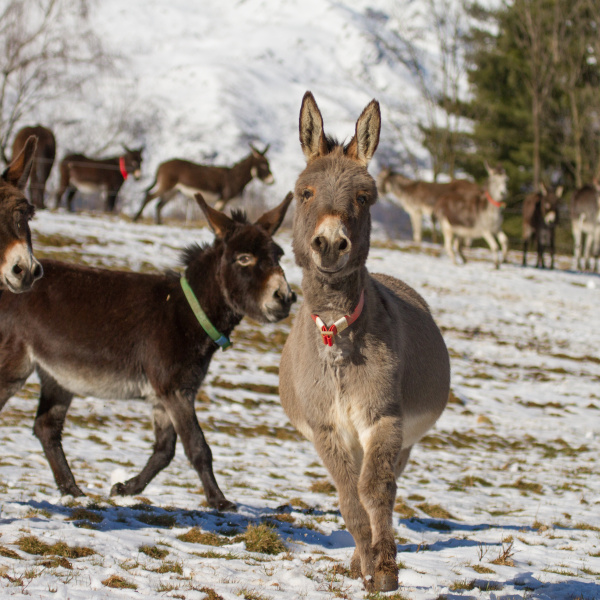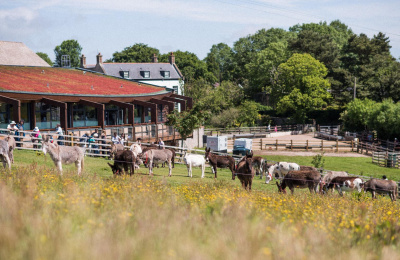As a donkey owner, you need to be prepared for the cold winter months. Winter care is about helping your donkey to cope with lower temperatures and to stay healthy during bad weather.
Getting prepared for the winter
It’s important to be prepared and plan ahead for the winter.
- Order your winter forage and bedding in plenty of time and keep an extra supply in case of bad weather
- Stock up on road salt for gritting areas of hardstanding in icy conditions
- Electrical lighting in your donkeys' shelter or stable is really useful as the morning and evenings get darker
- Access to warm water will be needed as most donkeys will refuse to drink very cold water
- Make sure you have a clean rug ready if your donkeys are likely to need them
- Make sure their vaccinations are up to date
- Schedule a visit from the farrier to check their feet
- Keep up to date with dental checks.
What are rain scald and mud fever?
Rain scald (also known as dermatophilosis) and mud fever are more prevalent during the winter months, particularly if your donkeys do not have access to shelter and hardstanding area. These conditions occur when the skin/hair is wet for a long period of time. Rain scald affects the shoulders, back and rump, while mud fever affects the lower limbs. They both cause crusting of the skin and matting of your donkey's coat. If you suspect your donkey may have either of these conditions, contact your vet for advice.
How do I provide a suitable shelter?
When choosing a location for your shelter, make sure the opening side out of prevailing winds. The floor of the shelter should be covered with fresh bedding. A fenced area of hardstanding next to your shelter or stable is also a necessary requirement for your donkeys, to be used if you need to keep your donkey off wet, muddy, or frosty ground.
A suitable donkey shelter should:
- Be in a sheltered area
- Have a concrete base if possible
- Have at least three sides with solid walls from the ground up
- Have a sloping roof
- Be weatherproof and free from draughts and water
- Have natural light
- Be well ventilated
- Have a water source.
See our stable measurement guide for more information on providing a shelter for your donkeys.
Does my donkey need a rug?
If your donkey is young and healthy and has constant access to shelter, they are unlikely to need a winter rug as their coat will naturally thicken as winter approaches.
If your donkey is elderly, sick or in poor condition, they will find it harder to maintain body heat. They may need a well-fitted donkey rug to keep warm.Your elderly donkey may also benefit from a heat lamp in their stable for extra warmth.
Remember to remove your donkey’s rug daily and brush their coat before replacing the rug. Do not brush your donkey if their coat is wet. Brushing while wet will move water and dirt onto the skin and could make them cold.
Have a spare rug in case one gets wet or damaged. Damaged rugs can be dangerous and should be repaired as soon as possible.
On warm, dry days, leave your donkey’s rug off for an hour or two. Make sure your donkey does not become cold or wet.
How do I keep my donkeys’ feet healthy during winter?
It's important to pick out your donkey's feet to avoid problems like thrush. Bedding in stables and shelters should be kept clean and dry and donkeys should be kept off muddy fields.
If your gateways become muddy during winter, but the paddocks are still suitable for grazing, then ordering some non- poisonous barkchip at the beginning of the winter months will ensure you have some to put in muddy gateways to help keep the donkeys feet clean and dry.

